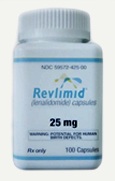 Celgene ($CELG) used a tried-and-true technique to persuade cost-effectiveness watchdogs to change their minds on Revlimid. The U.S.-based drugmaker capped its cost.
Celgene ($CELG) used a tried-and-true technique to persuade cost-effectiveness watchdogs to change their minds on Revlimid. The U.S.-based drugmaker capped its cost.
It was an about-face for the National Institute for Health and Care Excellence (NICE), which last month voted down the blood-cancer drug as a treatment for rare, serious bone marrow disorders called myelodysplastic syndromes. The agency wasn't convinced Revlimid benefited these patients enough to justify the pricey drug's cost.
Celgene got to work quickly. The company handed over some new data analyses. And it offered to limit the potential burden on Britain's National Health Service. Celgene will hand over the drug for free when patients need more than 26 monthly treatment cycles. With each month of Revlimid therapy costing an estimated £3,780, that's a tidy savings.
This sort of cost-sharing agreement has grown more common at NICE over the past several years. Johnson & Johnson ($JNJ) kicked off the trend by offering a money-back guarantee on treatment with its own multiple myeloma treatment Velcade. Merck KGaA offered a cost-sharing deal on its Erbitux cancer treatment, and Roche ($RHHBY) delivered an incremental money-back deal on Tarceva as a treatment for lung cancer, among others.
Celgene itself is experienced at price breaks for NICE. It offered a similar 26-week-therapy deal on Revlimid in certain multiple myeloma patients back in 2009. And in 2011, the company persuaded NICE to change its mind on Vidaza, a treatment for leukemia and myelodysplastic syndromes, by offering a cost-sharing deal.
But the company has struck out for the second time with Revlimid as a salvage treatment for multiple myeloma patients; NICE stiff-armed that idea again earlier this month. The agency offered a way forward though: Another 26-week cap, for instance.
Meanwhile, all this wheeling and dealing at NICE suggests that other payers might want to step up their own efforts at cost-sharing and money-back arrangements. With the expensive new hepatitis C drugs everyone's talking about, for instance.
- read the NICE release
Special Report: Top 20 orphan drugs by 2018 - Revlimid